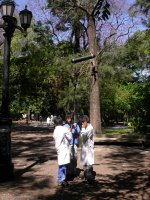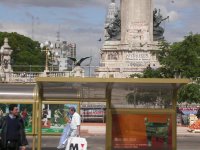Building a Creative Learning Culture in Newham, Stratford Circus, 12th December 2005
Risky Business Symposium, Melbourne, Australia, 21st-22nd October 2005
NFER conference: Becoming a research-engaged school, London, 27th September 2005
International Association for the Study of Popular Music: Rome 2005 Conference, 25 - 30 July 2005
Exploring Internationalism seminar, London 2012, 22nd June 2005
University College Chichester staff development day, 15th June 2005
FORTE London meeting, 10th June 2005
Creative Learning Spaces, University of Greenwich, 25th April 2005
Design and Performance research cluster seminar, Hinckley, 21st April 2005
arts research and development, learning, partnerships and creativity, urban musings, and other possible points of interest
Saturday, December 31, 2005
images from 2004 and 2005
images from 2005 (1)
Friday, December 02, 2005
a long month
four weeks from hell so I've not had time to post anything, let alone anything erudite here for a while. Some random reflections on events I've been at this autumn:
The Catalyst conference in Manchester which was in turns annoying and vague. A gathering of lots of interesting people but somehow the programme was set up in such a way that it was really difficult to find any spaces for meaningful conversation. And the charlatan Ben Zander's trivial and patronising musings on leadership were enough to force me away from the event a day earlier than I had planned. What a waste of money to put all those distinguished and intelligent people in a room and make them listen to such vacuous nonsense...
The Open Secrets seminar series that Demos has organised - both events I've attended have brought together a decent cross-section of people from the very top of the education and public services tree with practitioners and those like me that shuttle between different worlds. It's been good that a space has been created which draws together people from these different worlds to debate the hot issue of how you do innovation better; one obvious observation is that perhaps if more of these sorts of conversations were an everyday occurrence in education institutions then change might be more readily precipitated...
I went to the launch of The Turning World which is Rose Fenton and Lucy Neal's reflections on their extraordinary quarter century at LIFT. The book tells the story of all the artists, companies and happenings that LIFT brought to London since their 1983 debut. One of my absolutely favourite organisations, LIFT has constantly cut through navel-gazing and pretension that passes for contemporary theatre in many corners of London and brought work into being which is constantly challenging, vexing, mould breaking, etc etc. It's been a continual privilege to have been able to work with LIFT over the last nine or so years. What is so distinctive about LIFT is that it has a catalytic effect on the people touched by the work - it enables people to make journeys and transitions of their own - an example of redistributive leadership in action - (more on that in another post)
I went to Melbourne for the Risky Business conference which featured a really wide range of, in the main, well conceived and executed research projects documenting various arts interventions with young people deemed 'at risk.' What was so refreshing about the event (in spite of my jetlag and occasional sleepiness) was the openness with which the debates were conducted. There was a sharpness about recognising the double-tongued discourses of risk and 'exclusion' when applied to young people, when the last thing they need is to be labelled as is 'risky' and 'excluded'...a book of papers from the conference is planned in the new year and I'm looking forward to it...
I've been in Barcelona a couple of times to set up the teacher-artist partnership exchange. Every time I am in that city I am struck by how public culture, street culture, urbanism and outdoor discourse permeates the whole place...partly climate and partly the industrious and intellectual Catalan sharp and stylish hunger for knowledge and creativity...the big challenge seems to be about inclusion and diversity - how does this highly evolved urban culture learn how to deal with difference and develop education systems which allow access into this urban culture for all? How does a justifiable pride in the extraordinary regeneration story translate into education and learning systems in which all young people can participate, particularly in an arts scene where there is an apparently unstoppable supply of 'talent' in any case ? It may be the home of the 'learning city'movement but there seems still to be a long way to go in opening up further and higher education institutions to participation. I may be doing some more thinking about that in 2006. We'll see. There may also be some parallels to be drawn between what is currently happening in Glasgow's arts education planning and what is happening in Barcelona. Or maybe not.
I've spent far too much time in airport land and passenger processing systems. As the government hypes up the cold weather and threat of energy crisis further in order to build the strange logic (and weird and scary science) around nuclear power, I'm conscious that I've personally done precious little to help the case that our insatiable hunger for energy is at the root of the issue. I've just been lining the pockets of the airlines and the oil companies. No need to rehearse all the arguments here, but if we could just have a serious energy conservation and usage reduction policy we might be able to reduce our dependence on gas guzzling and gigawatts. But I'm utterly hypocritical because I've spent far too much time whizzing around to make a credible argument. If even more people continue to behave like me (as they appear to be doing) we really are staring at the edge of the abyss in environmental terms.
I went to the Designing for the 21st Century 'reflections and projections' conference in Glasgow. This was another useful collection of very disparate projects, very interdiscipinary, very divergent - although, as with so many things, there was a lack of representation from beyond the citadels of higher education in spite of the initiative being about collaboration, knowledge exchange, etc. There was an overwhelming consensus, in spite of this not being the explicit aim of the initiative, that ecological catastrophe is the key design challenge over the next thirty years: and that all designers in whatever sense need to be thinking about this. Design in this sense is about survival - social architecture, intelligent urban systems, re-use and recycling of materials, design for longevity and adaptability, entredonneurship (the first time I've heard that word used, and it deals with some of the problems of the 'social enterprise' model rather neatly I think) and - what I'm interested in - the design of learning systems that build capacity for dialogue, exchange and progression will all be crucial.
The Catalyst conference in Manchester which was in turns annoying and vague. A gathering of lots of interesting people but somehow the programme was set up in such a way that it was really difficult to find any spaces for meaningful conversation. And the charlatan Ben Zander's trivial and patronising musings on leadership were enough to force me away from the event a day earlier than I had planned. What a waste of money to put all those distinguished and intelligent people in a room and make them listen to such vacuous nonsense...
The Open Secrets seminar series that Demos has organised - both events I've attended have brought together a decent cross-section of people from the very top of the education and public services tree with practitioners and those like me that shuttle between different worlds. It's been good that a space has been created which draws together people from these different worlds to debate the hot issue of how you do innovation better; one obvious observation is that perhaps if more of these sorts of conversations were an everyday occurrence in education institutions then change might be more readily precipitated...
I went to the launch of The Turning World which is Rose Fenton and Lucy Neal's reflections on their extraordinary quarter century at LIFT. The book tells the story of all the artists, companies and happenings that LIFT brought to London since their 1983 debut. One of my absolutely favourite organisations, LIFT has constantly cut through navel-gazing and pretension that passes for contemporary theatre in many corners of London and brought work into being which is constantly challenging, vexing, mould breaking, etc etc. It's been a continual privilege to have been able to work with LIFT over the last nine or so years. What is so distinctive about LIFT is that it has a catalytic effect on the people touched by the work - it enables people to make journeys and transitions of their own - an example of redistributive leadership in action - (more on that in another post)
I went to Melbourne for the Risky Business conference which featured a really wide range of, in the main, well conceived and executed research projects documenting various arts interventions with young people deemed 'at risk.' What was so refreshing about the event (in spite of my jetlag and occasional sleepiness) was the openness with which the debates were conducted. There was a sharpness about recognising the double-tongued discourses of risk and 'exclusion' when applied to young people, when the last thing they need is to be labelled as is 'risky' and 'excluded'...a book of papers from the conference is planned in the new year and I'm looking forward to it...
I've been in Barcelona a couple of times to set up the teacher-artist partnership exchange. Every time I am in that city I am struck by how public culture, street culture, urbanism and outdoor discourse permeates the whole place...partly climate and partly the industrious and intellectual Catalan sharp and stylish hunger for knowledge and creativity...the big challenge seems to be about inclusion and diversity - how does this highly evolved urban culture learn how to deal with difference and develop education systems which allow access into this urban culture for all? How does a justifiable pride in the extraordinary regeneration story translate into education and learning systems in which all young people can participate, particularly in an arts scene where there is an apparently unstoppable supply of 'talent' in any case ? It may be the home of the 'learning city'movement but there seems still to be a long way to go in opening up further and higher education institutions to participation. I may be doing some more thinking about that in 2006. We'll see. There may also be some parallels to be drawn between what is currently happening in Glasgow's arts education planning and what is happening in Barcelona. Or maybe not.
I've spent far too much time in airport land and passenger processing systems. As the government hypes up the cold weather and threat of energy crisis further in order to build the strange logic (and weird and scary science) around nuclear power, I'm conscious that I've personally done precious little to help the case that our insatiable hunger for energy is at the root of the issue. I've just been lining the pockets of the airlines and the oil companies. No need to rehearse all the arguments here, but if we could just have a serious energy conservation and usage reduction policy we might be able to reduce our dependence on gas guzzling and gigawatts. But I'm utterly hypocritical because I've spent far too much time whizzing around to make a credible argument. If even more people continue to behave like me (as they appear to be doing) we really are staring at the edge of the abyss in environmental terms.
I went to the Designing for the 21st Century 'reflections and projections' conference in Glasgow. This was another useful collection of very disparate projects, very interdiscipinary, very divergent - although, as with so many things, there was a lack of representation from beyond the citadels of higher education in spite of the initiative being about collaboration, knowledge exchange, etc. There was an overwhelming consensus, in spite of this not being the explicit aim of the initiative, that ecological catastrophe is the key design challenge over the next thirty years: and that all designers in whatever sense need to be thinking about this. Design in this sense is about survival - social architecture, intelligent urban systems, re-use and recycling of materials, design for longevity and adaptability, entredonneurship (the first time I've heard that word used, and it deals with some of the problems of the 'social enterprise' model rather neatly I think) and - what I'm interested in - the design of learning systems that build capacity for dialogue, exchange and progression will all be crucial.
Friday, October 28, 2005
This month's essential reading
Willing Slaves: how the overwork culture is ruling our lives, by Madeleine Bunting
Babylon and Beyond: the economics of anti-capitalist, anti-globalist and radical green movements, by Derek Wall
City of Panic, by Paul Virilio
Babylon and Beyond: the economics of anti-capitalist, anti-globalist and radical green movements, by Derek Wall
City of Panic, by Paul Virilio
Journeys Across My City goes to Barcelona
The Buenos Aires films are being screened in Barcelona as part of the international children's television festival on November 15th. They are also being screened at the Lineout Can Film Festival in Leicester this weekend, and were recently shown again in Sydney. It's nice to see them travelling so well and so far...
More information from Redcurrent Films.
Graham is off to Barcelona again this week to plan the international exchange for the Teacher Artist Partnership programme and also to plot future developments with Journeys Across My City...
More information from Redcurrent Films.
Graham is off to Barcelona again this week to plan the international exchange for the Teacher Artist Partnership programme and also to plot future developments with Journeys Across My City...
Sunday, September 18, 2005
Marimekko exhibition
The Lighthouse in Glasgow is currently hosting a small but fascinating retrospective exhibition about the work of Marimekko, that superb and innovative design/fashion company that became synonymous with Finland's renaissance in the 1960s and 1970s. What Armi Ratia, who founded Marimekko, understood was that the democratic modernism which underpinned the optimistic and sunny culture of the business would benefit both producers and consumers: a kind of updated Bauhaus and William Morris sprit which aimed to democratise radical design, extending beyond clothes into the whole domestic environment. Perhaps no coincidence that 95% of their employees are still women.
The company's design culture was prophetic and pre-figurative in many ways: they rapidly moved beyond boldly printed textiles, and carefully made clothes with clean lines, into accessories, furniture, and thence into architecture and wider design. Marimekko became a total design concept but without cultishness or pretension- because it maintained an ironic, playful, eclectic sprit. The fashion philosophy was always about much more than clothes, and they never designed just for a skinny young minority. Hugely influential, hugely important, they pioneered an ethical, modernist, optimistic aesthetic that still holds promise. This book tells the story. And this article about the exhibition recently appeared in Scotland on Sunday.
The company's design culture was prophetic and pre-figurative in many ways: they rapidly moved beyond boldly printed textiles, and carefully made clothes with clean lines, into accessories, furniture, and thence into architecture and wider design. Marimekko became a total design concept but without cultishness or pretension- because it maintained an ironic, playful, eclectic sprit. The fashion philosophy was always about much more than clothes, and they never designed just for a skinny young minority. Hugely influential, hugely important, they pioneered an ethical, modernist, optimistic aesthetic that still holds promise. This book tells the story. And this article about the exhibition recently appeared in Scotland on Sunday.
Saturday, September 17, 2005
airline of the moment
the future (at least until the oil runs out, and the apocalypse hits) is small aircraft...much simpler, much quicker.
if the trains ran faster then there would be no need to fly...but having spent 5 and a half hours yesterday trying to get from manchester to glasgow by train, one can see the attraction...
if the trains ran faster then there would be no need to fly...but having spent 5 and a half hours yesterday trying to get from manchester to glasgow by train, one can see the attraction...
music of the moment
autobahn, (side a of the LP only, side b is just too cheesy) by Kraftwerk - played very quietly it becomes almost ambient
Sugarcubes albums and 12inches played very loud
Kenneth Leighton's sacred choral music
The milk-eyed mender by Joanna Newsom (a favourite of our 7 year old daughter, but suitable for grown-ups too)
Mpho Skeef's new EP
Sugarcubes albums and 12inches played very loud
Kenneth Leighton's sacred choral music
The milk-eyed mender by Joanna Newsom (a favourite of our 7 year old daughter, but suitable for grown-ups too)
Mpho Skeef's new EP
Saturday, September 03, 2005
devouring apocalypse balloons
Two of the three concerts that Graham did as a pianist with Current 93 live in Toronto in June 2004 have now been released on the Durtro/Jnana label, as a two-CD set: How I Devoured Apocalypse Balloon. Also playing were Michael Cashmore, guitar, Simon Finn, vocals/guitar, Ben Chasny/Six Organs of Admittance, guitar, John Contreras, cello and of course David Michael - late Tibet. The recording captures the unique atmosphere of the concerts and is highly recommended as an excellent document for those familiar and less familiar with Current 93. Also just released is Judas as Black Moth , a retrospective of this highly influential group from the English underground's work.
Monday, August 29, 2005
Birmingham
Went down to Birmingham last Friday to talk to some schools for the Specialist Schools Trust: what a transformation has happened in the city centre since I was last there ten years ago! Trouble is, it's all so shiny and corporate that it looks much the same as any other regional city centre...once again the construction of urban images has driven the development of the downtown to the point where the private and public money has flooded in but there doesn't seem to be much of a vision beyond the usual retail cluster, dull business services and some fairly poor street performances to 'animate' the space. Not good enough! Sure there are the galleries, theatres, exhibition spaces etc but they recede compared to the urban retail spectacle.
I wandered around the shops at the end of the day and no-one appeared to be spending much money; just hanging out like me. is the uk turning into a debt ridden society of cappucino consumers? time for some local distinctiveness I think and time for some radical thinking about placemaking, locality and building capacity for local businesses and difference. otherwise we will all just be living in super-surveillance airport liminal space or in the ghetto, with not much in between. And what is happening in New Orleans is a huge and scary lesson in why there's a need for social infrastructure, social policy, and why the unbridled market will never provide on its own.
I wandered around the shops at the end of the day and no-one appeared to be spending much money; just hanging out like me. is the uk turning into a debt ridden society of cappucino consumers? time for some local distinctiveness I think and time for some radical thinking about placemaking, locality and building capacity for local businesses and difference. otherwise we will all just be living in super-surveillance airport liminal space or in the ghetto, with not much in between. And what is happening in New Orleans is a huge and scary lesson in why there's a need for social infrastructure, social policy, and why the unbridled market will never provide on its own.
Friday, August 12, 2005
Some more festivals for 'Journeys Across My City'
The two Journeys Across My City - Buenos Aires films have been selected for three more film festivals, so you can catch them in lots of different places. They are
5-8 Sept 2005 Talent Circle Super Shorts Festival, London
September 19-23, 2005: 8th edition Auburn International Film and Video Festival for Children and Young Adults, Sydney, Australia
October 2005: Document3 Human Rights International Film Festival, Glasgow
You can also view them online, if you have access to RealMedia, on
UNESCO's website
You can also view them online, if you have access to RealMedia, on
UNESCO's website
Sunday, July 24, 2005
Zero Degrees
My colleague and friend Tim Lawrence writes on Khan/Sawhney/Gormley/Larbi Cherrkauoui's Zero Degrees. Everyone I've spoken to who went to see this says that it is absolutely of its time. If anyone wants an argument for the absolute relevance of the performing arts in a fragmented and dangerous world, this work sounds like it's it....
http://www.sadlerswells.com/whats_on/2005_2006/zero.asp
http://www.sadlerswells.com/whats_on/2005_2006/zero.asp
Tuesday, July 19, 2005
IKEA
Wandering round IKEA looking for mattress covers at 9.30pm on a Saturday night is a waste of a life.
Friday, July 15, 2005
urban tapestries
Interesting blog of research project exploring social production of knowledge, informal knowledge generation and sharing, etc.
Tuesday, July 12, 2005
Applied Imagination
US based blog on 'applied imagination' - creativity in business and for non-profits, linked to the 'creative problem solving institute'.
Tuesday, July 05, 2005
'The Creative College' is published!
At last the book is out. The blurb on the back explains its content:
Creative partnership in education is increasingly being recognised as an inspirational and effective way of teaching and learning. This timely book describes some successful initiatives and suggests how schools, colleges, universities and arts organisations can make such partnerships work.
Arts partnership has been strongly developed at Newham Sixth Form College (NewVIc), a large and diverse sixth form college in east London. The case studies by teachers and artists who developed the projects show how they collaborate with each other and with arts organisations to create a culture of artistic aspiration and success for their students. The contributors analyse what is needed to make such partnerships a success and explore the issues and challenges faced by teachers and artists who want to collaborate in this way.
The idea of creative partnership is firmly located in the context of debates about urban schooling, 'the learning city' and community regeneration. The book weaves together the voices of students, teachers and artists working to create a shared culture for learning.
The Creative College will be of interest to students, teachers and practitioners in education, arts education, community arts and community development.
The contributors are Andrew Blake, Kelly Davidson, Rachel Fell, Sid Hughes and Jo Parkes, and the editor, Graham Jeffery, who was arts research and development manager at NewVIc and is currently seconded to the University of East London as Programme Leader for Performing Arts.
You can order the book from amazon by clicking on the link on the right...
Creative partnership in education is increasingly being recognised as an inspirational and effective way of teaching and learning. This timely book describes some successful initiatives and suggests how schools, colleges, universities and arts organisations can make such partnerships work.
Arts partnership has been strongly developed at Newham Sixth Form College (NewVIc), a large and diverse sixth form college in east London. The case studies by teachers and artists who developed the projects show how they collaborate with each other and with arts organisations to create a culture of artistic aspiration and success for their students. The contributors analyse what is needed to make such partnerships a success and explore the issues and challenges faced by teachers and artists who want to collaborate in this way.
The idea of creative partnership is firmly located in the context of debates about urban schooling, 'the learning city' and community regeneration. The book weaves together the voices of students, teachers and artists working to create a shared culture for learning.
The Creative College will be of interest to students, teachers and practitioners in education, arts education, community arts and community development.
The contributors are Andrew Blake, Kelly Davidson, Rachel Fell, Sid Hughes and Jo Parkes, and the editor, Graham Jeffery, who was arts research and development manager at NewVIc and is currently seconded to the University of East London as Programme Leader for Performing Arts.
You can order the book from amazon by clicking on the link on the right...
Thursday, June 30, 2005
Journeys Across My City at the G8 Summit
We have just heard that the films 'Journeys Across My City' that Graham worked on in Buenos Aires, with students from east London and Redcurrent Films are to be screened in the mobile, solar powered cinema outside the G8 Summit at Gleneagles.
Wednesday, June 15, 2005
Richard Florida
Richard Florida makes my feeble attempts at self-publicity pale into insignificance.
Thursday, June 02, 2005
Saturday, May 28, 2005
del.icio.us
I am really enjoying this social bookmarking thing. Endless fascination from simple interactive listmaking. The dominant posts are still on the nerdy side but nonetheless there are all kinds of interesting things out there to discover.
Thursday, May 26, 2005
Some interesting websites on design, health and ecology
http://www.design21.dundee.ac.uk/home.html
http://www.designandhealth.com/
http://www.nature-inspired.org/
http://www.thedesignclinic.co.uk/default.php
http://www.designandhealth.com/
http://www.nature-inspired.org/
http://www.thedesignclinic.co.uk/default.php
Friday, May 20, 2005
Chicago Arts Partnerships in Education - blog
This is the blog of the people at CAPE - where they post comments, thoughts, reviews etc
Thursday, May 12, 2005
Welcome
now and again we will post information, comments, points of interest to us...to get a sense of what generalpraxis is interested in you can check out the links...we are new to this blogging game, so bear with us.
Subscribe to:
Comments (Atom)






